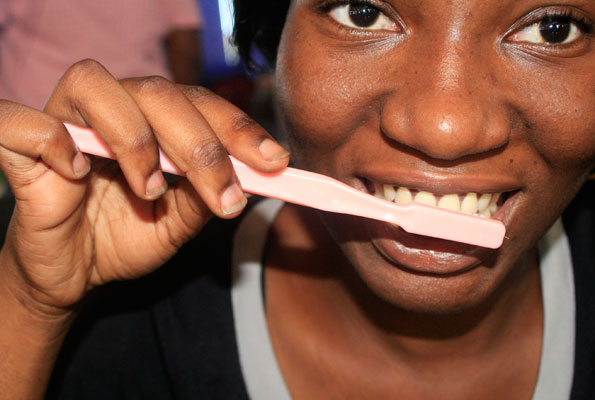Kissing and oral infections

Brush your teeth often to prevent oral diseases. Photo by Rachel Ajwang.
What you need to know:
- Current research shows that several viruses can be contained in the saliva of an infected person and, therefore, can be transmitted through exchange of saliva.
In the late 80s, at the advent of HIV, there was a lot of fear among people on whether kissing could transmit the HIV virus. Science tells us that HIV is not transmissible through kissing. However, kissing may transmit other kinds of bacteria.
The commonest example that can be given is mothers kissing their babies. Children will not have cavity-causing bacteria in their mouth naturally, but they slowly pick them, mostly from their mothers (and anyone else who kisses the baby).
Kissing involves exchange of salivary fluids and it is these fluids that contain the bacteria responsible for dental caries and periodontal disease. Certain cultures involve mothers chewing food and then passing it to their children, which is a major contributor to the bacterial load that eventually colonises your child’s mouth.
Mothers are also known to suckle on the bottle to check the temperature of the milk before they pass it onto the child. Herein lies another avenue for transfer of bacteria to the child. So, in case you were wondering where your children get the bacteria that is destroying their teeth, now you have a possible idea on where it came from.
What about kissing in adults?
Current research shows that several viruses can be contained in the saliva of an infected person and, therefore, can be transmitted through exchange of saliva. Key among these is hepatitis viruses, herpes simplex virus and coronaviruses, among others. One key thing to note here is that some of these viruses once transmitted may or may not cause disease, depending on the immune status of the recipient.
Herpes simplex viruses have been known to cause oral and genital sores and in some cases, severe disease in people whose immune systems have been weakened by disease such as HIV/Aids or chemotherapy for cancer treatment.
Bottom line: Since kissing is an act of exchange of bodily fluids, there is always risk of transmitting infections between those kissing. It, therefore, pays to know the health status of the person you are kissing beforehand.
Dr Trevor Kwagala,
Dental surgeon




